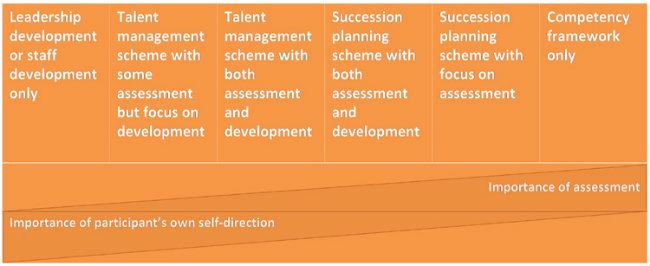All succession and talent schemes have some element of assessing the individual’s capacity, but the importance of this element to your scheme varies depending on:
- The purpose and expected benefits;
- The size and scope of your scheme;
- The acceptability of assessment within your institution;
- The number of people involved and the resources available – including whether you already have a competency framework for the roles in question, or are prepared to put time into developing one.
Returning to our definitions of succession and talent may help to illustrate this point. If your scheme focuses on the individual you will probably want to place a greater emphasis on supporting the individual’s own self-perceptions; if it focuses on the roles you will want to ensure the objectivity and independence of the assessment.
We define selection as the initial consideration of who should be assessed. Participants may be selected by their line managers or may self-select, or selection may be via a mix of the two, or may have been done at the point of scheme design as in Nottingham Trent’s scheme.
"Our principle is that participation is both inclusive and obligatory. Everyone in the identified feeder groups takes part, and participants’ views and career aspirations are taken into account in the assessment process along with data on their performance and experience. If after going through the process a participant says they are not interested in the role being planned for, that is fine – but it’s not expected that they will rule themselves out beforehand."
Nottingham Trent University
The Assessment Spectrum

Once selected for assessment, participants may take part in one or more of a vast array of assessment activities, or in some cases (towards the left of the diagram above) they may assess themselves or provide a CV to demonstrate that they have the required experience. Key elements to bear in mind when designing the more formal assessment systems include:
- Several perspectives (‘triangulation’);
- Discussion to make sense of the various elements and reach agreement (involving appropriate stakeholders);
- In-person feedback to the individual.
You might find it useful to take a look at examples of criteria for assessment from the BBC, Imperial College London and Newcastle University. You can also read some illustrative quotes about selection and assessment issues from the case study organisations here.



Assessment centre? Development centre?
There is often confusion between the two, not least because the formats may be very similar – simulations, personality profiling, in-tray exercises and the like. The format may be the same but the difference lies in the use that is made of the outputs. Some, like Newcastle's, may be a deliberate combination - an assessment and development centre.